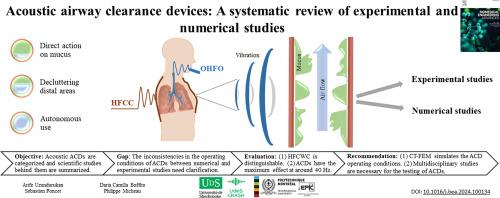Acoustic airway clearance devices: A systematic review of experimental and numerical studies
引用次数: 0
Abstract
The global respiratory care devices market, including acoustic airway clearance devices (ACDs), is expected to experience a compound annual growth rate of 6.10 % from 2023 to 2030. However, there are a number of inconsistencies in the categorization and working frequency range from one discipline to another one. A better understanding of the mechanisms of action of these devices is therefore of prime importance in order for physicians, physiotherapists, scientists, and engineers to remain abreast of up-to-date studies in the field and specifically on the frequency range used. In the present review, we have categorized acoustic ACDs according to their working principles while reviewing their existing shortcomings in both experimental and numerical studies, thereby paving the way for future research directions. A total of 14 different ACDs are discussed, taking into account their working principle and frequency range, and classified as follows: mechano-acoustic devices, high-frequency chest wall compression (HFCWC), and high-frequency chest wall oscillation (HFCWO) for high-frequency chest compression (HFCC) and oral high-frequency oscillation (OHFO). Existing studies highlight that ACDs with HFCWC distinguish themselves from other devices by supplying compression in a homogeneous manner, allowing the delivery of both efficient and gentle therapy up to approximately 40 Hz. Notwithstanding, a stark difference in the working frequency range across the various devices was found and identified as a literature gap. Given that this difference arises from both experimental and numerical studies between the various disciplines, the studies are further classified according to their respective objectives, methodology and outputs to help readers quickly and straightforwardly locate the articles of interest for potential future investigations. The review also brings to light the interdisciplinary nature of ACDs, whereby numerical biomedical studies can actively assist experimental studies in terms of reproducibility and reliability, creating a digital twin of the human chest and its respective components.

声波气道清除装置:实验和数值研究的系统回顾
预计从 2023 年到 2030 年,全球呼吸护理设备市场(包括声学气道通畅设备 (ACD))的复合年增长率将达到 6.10%。然而,各学科在分类和工作频率范围上存在一些不一致。因此,更好地了解这些设备的作用机制对于医生、物理治疗师、科学家和工程师掌握该领域的最新研究成果,特别是所使用的频率范围至关重要。在本综述中,我们根据声学 ACD 的工作原理对其进行了分类,同时回顾了其在实验和数值研究中存在的不足,从而为未来的研究方向铺平了道路。考虑到其工作原理和频率范围,共讨论了 14 种不同的 ACD,并将其分类如下:机械声学设备、高频胸壁压缩(HFCWC)和高频胸壁振荡(HFCWO),用于高频胸壁压缩(HFCC)和口腔高频振荡(OHFO)。现有研究强调,带有 HFCWC 的 ACD 有别于其他设备,因为它能以均匀的方式提供压力,在高达约 40 Hz 的频率下提供高效而温和的治疗。尽管如此,我们发现各种设备的工作频率范围存在明显差异,并将其确定为文献空白。鉴于这种差异来自于不同学科之间的实验和数值研究,我们根据各自的目标、方法和结果对这些研究进行了进一步分类,以帮助读者快速、直接地找到感兴趣的文章,进行潜在的未来调查。本综述还揭示了 ACD 的跨学科性质,即数字生物医学研究可在可重复性和可靠性方面积极协助实验研究,从而创建人体胸部及其各组成部分的数字孪生模型。
本文章由计算机程序翻译,如有差异,请以英文原文为准。
求助全文
约1分钟内获得全文
求助全文
来源期刊

Biomedical engineering advances
Bioengineering, Biomedical Engineering
自引率
0.00%
发文量
0
审稿时长
59 days
 求助内容:
求助内容: 应助结果提醒方式:
应助结果提醒方式:


